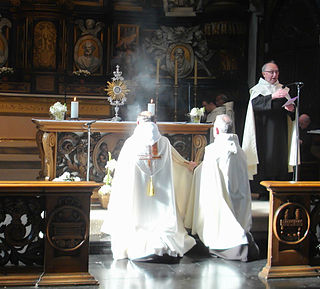
A benediction is a short invocation for divine help, blessing and guidance, usually at the end of worship service. It can also refer to a specific Christian religious service including the exposition of the eucharistic host in the monstrance and the blessing of the people with it.

The Feast of Corpus Christi, also known as the Solemnity of the Most Holy Body and Blood of Christ, is a liturgical solemnity celebrating the real presence of Christ in the Eucharist; the feast is observed by the Latin Church, in addition to certain Western Orthodox, Lutheran, and Anglican churches. Two months earlier, the institution of the Eucharist at the Last Supper is observed on Maundy Thursday in a sombre atmosphere leading to Good Friday. The liturgy on that day also commemorates Christ's washing of the disciples' feet, the institution of the priesthood, and the agony in the Garden of Gethsemane.

Samuel Webbe was an English composer.
"O Salutaris Hostia" is section of one of the Eucharistic hymns written by Thomas Aquinas for the Feast of Corpus Christi and the Hour of Lauds in the Divine Office. It is actually the last two stanzas of the hymn Verbum supernum prodiens and is used for the Adoration of the Blessed Sacrament. The other two hymns written by Aquinas for the Feast contain the famous sections Panis angelicus and Tantum ergo.

Benediction of the Blessed Sacrament, also called Benediction with the Blessed Sacrament or the Rite of Eucharistic Exposition and Benediction, is a devotional ceremony, celebrated especially in the Roman Catholic Church, but also in some other Christian traditions such as Anglo-Catholicism, whereby a bishop, a priest, or a deacon blesses the congregation with the Eucharist at the end of a period of adoration.
Caterina Assandra was an Italian composer and Benedictine nun. In her surviving motet book, Motetti a due a tre voci op.2, Assandra alludes to her birthplace being in the Province of Pavia. She became famous as an organist and published various works during her lifetime. Her work Motetti a due was dedicated to G.B. Biglia, the Bishop of Pavia, and was first recognized by publisher Lomazzo. Although Assandra had accumulated a substantial reputation for her works as a composer, even reaching outside the borders of Italy, she was at times confused with an 18th-century composer with the same name. And although the date of her birth is approximate, the date of her death is still unknown.

"Lauda Sion" is a sequence prescribed for the Roman Catholic Mass for the feast of Corpus Christi. It was written by St. Thomas Aquinas around 1264, at the request of Pope Urban IV for the new Mass of this feast, along with Pange lingua, Sacris solemniis, and Verbum supernum prodiens, which are used in the Divine Office.

Panis angelicus is the penultimate stanza of the hymn "Sacris solemniis" written by Saint Thomas Aquinas for the feast of Corpus Christi as part of a complete liturgy of the feast, including prayers for the Mass and the Liturgy of the Hours.
Jubilate Deo is a small hymnal of Gregorian chant in the Latin Rite of the Catholic Church, produced after the liturgical reforms of Vatican II. It contains a selection of chants used in the Mass and various liturgies, as well as Marian antiphons and seasonal hymns.
"Adoro te devote" is a prayer written by Thomas Aquinas. Unlike hymns which were composed and set to music for the Solemnity of Corpus Christi, instituted in 1264 by Pope Urban IV for the entire Latin Church of the Catholic Church, it was not written for a liturgical function and appears in no liturgical texts of the period; some scholars believe that it was written by the friar for private use at Mass. The text has since been incorporated into public worship as a hymn.
Pange lingua may refer to either of two Mediaeval Latin hymns:

Vytautas Miškinis is a Lithuanian composer, choral conductor and academic teacher. He is artistic director of Ąžuoliukas, a boys' and youth choir and music school, and of other ensembles, performing internationally. He has taught choral conducting at the Lithuanian Academy of Music and Theatre from 1985. His groups have won prizes at international competitions, where he also served as member of the jury. His compositions are part of international standard choral repertoire.

"Sacris solemniis" is a hymn written by St. Thomas Aquinas (1225–1274) for the feast of Corpus Christi. The strophe of Sacris solemniis that begins with the words "Panis angelicus" has often been set to music separately from the rest of the hymn. It appears about 1768 in the iberian musical form Vilancete/Villancico at Francesc Morera's "Si el grano divino". Most famously, in 1872 César Franck set this strophe for voice (tenor), harp, cello, and organ, and incorporated it into his Messe à trois voix Opus 12. The hymn expresses the doctrine that the bread and wine are changed into the Body and Blood of Christ. In the Roman Catholic tradition the concept of transubstantiation is presented as an explanation of how this change happens.

The Novena to Our Mother of Perpetual Help is a booklet containing a set of prayers including the Roman Catholic novena to Our Mother of Perpetual Help, that was originally published in Jaén, Spain in 1899. It was then widely republished by American Redemptorist priests in 1927, then ultimately revised by Irish and Australian Redemptorist priests on 23 June 1948.
O salutaris hostia is a composition for choir a cappella by Vytautas Miškinis, a setting of the Latin prayer O salutaris hostia. Written in 1991, it was published by Carus in 2001. It has been performed in concerts internationally, and was recorded.

Messe brève no. 7 is a missa brevis in C major by Charles Gounod, composed in 1877 for two vocal parts and organ, and expanded in 1890 to four choir parts and organ. It is subtitled "in C aux chapelles".











